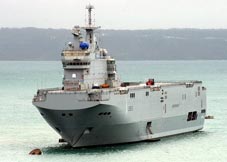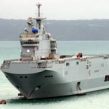
Moscow Seeks French High-Tech Transfers With Mistral Amphibious Assault Ship
Publication: Eurasia Daily Monitor Volume: 7 Issue: 4
By:

Russia’s military modernization ambitions include a shift from fully self-sufficient arms procurement to selective purchase of advanced military technologies from abroad. As Ruslan Pukhov, presidium member of the Russian Defense Ministry’s Public Advisory Council, observes, the acquisition of Mistral-class warships from France would constitute a manifestation of that shift in Russia’s military modernization policy (Interfax, January 5).
Russian officials currently emphasize the value of advanced technology transfers to Russia that would accompany the possible acquisition of Mistral-class ships. According to Pukhov, Russia is interested in the Mistral not only or primarily for its amphibious assault capabilities, but for its value as a command platform with advanced electronics for battle management and network-centric military operations at sea, as well as its hydroacoustics.
Following Prime Minister Vladimir Putin’s late-November visit to Paris, where the Mistral acquisition was discussed, Russian officials are placing greater emphasis on the transfer of sophisticated technology. Statements by Russia’s defense ministry spokesman and by the naval command on December 14 and 21, respectively, also indicated that Moscow now seeks the technology transfer as a condition of the purchase from France. The same Russian officials also confirmed that Moscow has approached Spain and the Netherlands for the possible acquisition of amphibious assault warships built in those countries, if Russia and France do not agree to terms (RIA Novosti, December 14; Interfax, December 21).
In the initial stage of negotiations, Moscow had publicly stated that Mistral class ships would endow Russia with amphibious warfare capabilities of a modern type, which Russia was shown to lack when it invaded Georgia. Thus, Moscow initially sought Mistral-class ships as platforms for helicopter assault and seaborne landing operations, without emphasizing transfers of sophisticated technology. The new, bolder emphasis on technology suggests that Moscow is gaining confidence in the bargaining with France. It also amounts to floating a trial balloon to NATO and European Union authorities and member countries. Their continuing silence on this issue would further embolden Moscow.
The French side also seems to have emboldened Moscow inadvertently. Prime Minister Francois Fillon and the French defense ministry sounded particularly keen to promote the Mistral sale during Putin’s late-November visit.
A French defense ministry delegation led by Alain Costes, the ministry’s Chief Engineer for Armaments, visited St. Petersburg in mid-December to discuss licensing of Mistral-class ship construction in Russia. The delegation examined the Baltic Shipyard’s berths and workshops to ascertain its capacity for building copies of Mistral-class ships (Interfax, December 18, January 5).
Current discussions envisage the outright sale of one such ship (the French had proposed two) and licensing the construction of three or four such ships in Russian shipyards.
Russian policy makers and interest groups seem to have reached consensus on the essentials of such a transaction. Initially, protectionist interests in the Russian defense industry as well as past-oriented pundits (with the inevitable contingent of retired admirals) had voiced objections. They wanted the defense ministry to finance the construction of a Mistral-equivalent in Russian shipyards and worried about the abandonment of the old policy of self-sufficient arms procurement. The Russian government and top brass, however, had by mid-2009 opted for the French solution.
Putin, Defense Minister Anatoly Serdyukov, the Chief of the General Staff Army-General Nikolai Makarov, Navy Chief of Staff Admiral Vladimir Vysotskiy and first deputy chief of staff Oleg Burtsev, are among the Russian officials publicly endorsing the French solution, while bargaining over specific terms (and holding the Spanish and Dutch options in reserve, at least declaratively). They make no secret of their view that Russian shipyards cannot build a warship even remotely comparable to the Mistral. However, buying the first such ship from France and building several licensed copies in Russian shipyards (as envisaged) would clearly satisfy Russian industrial interests. This would involve procurement orders as well as assimilating French technology into the Russian defense industry.
Clearly, a consensus on this matter has crystallized among Russian government agencies and interest groups on the general terms of a Mistral deal, while specifics remain subject to negotiations. Even without its highly sophisticated electronics, Mistral-class ships would provide the Russian military with a platform for offensive landing operations.
The Mistral carries 16 attack and landing helicopters (while allowing the operation of up to 30 on both decks), 900 troops, four conventional landing craft (also allowing the operation of two hovercraft), and 40 Leclerc tanks, or alternatively 13 tanks and 40 other vehicles These are the figures for short-term operations, which are primarily relevant to Russia for possible actions in theaters nearby (EDM, September 18, November 2, December 2).
This class of ships is intended specifically for power-projection and can, in Russia’s hands, serve to intimidate countries in the Baltic and Black Sea or elsewhere. In a widely quoted public statement last year, Admiral Vysotskiy alluded to Georgia in this regard. Putin told French media that Russia would use these warships “wherever they would be needed” (Agence France Presse, November 27, 2008), meaning no restrictions on deployment.
The Estonian, Latvian, and Lithuanian defense ministers expressed concern at their latest quarterly meeting. Hosting the session, Latvian Defense Minister Imants Liegis summed up, “Obviously the appearance of such a ship in the Baltic Sea could change the security situation in the region. Cooperation between NATO and Russia, the EU and Russia must not take place at the expense of other countries’ security” (BNS, December 11). The Russian Ambassador to Latvia, Aleksandr Veshnyakov, has side-stepped journalists’ questions about any possible deployment of the Mistral in the Baltic Sea (BNS, January 4).
If the sale goes forward, France would become the first NATO or EU member country to provide Russia with a major weapons system. This could in turn serve as precedent and excuse for NATO countries individually to sell various armaments to Russia, with scant regard for the Alliance’s (or the EU’s) coordinating procedures in this regard.




